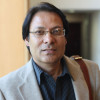
Studying end of life care in the global context poses particular challenges due to the diversity of cultural meanings and expectations surrounding death and dying in different global settings.
With culturally specific ideas of the ‘good death’ and ‘bad death’, ‘end of life’ becomes a fascinating topic for me as an anthropologist.
In a palliative care situation, the stakeholders include the care providers, patients and their family members. Participation from the ‘stakeholders’ presents itself differently among different cultures and the body of the dying person becomes an arena for contested cultural assumptions.
The possible ‘clash of cultures’ becomes particularly problematic when the providers of palliative care in non-Western countries adopt guidelines developed in a Western context as their standard.
Although death is acknowledged as something that concerns the entire population, there is still a dearth of interest about end of life care within the domain of global health.
Global variations
End of life care is complex in nature: it is an interdisciplinary, holistic, comprehensive group concern.
There is also an extensive global diversity in terms of the understanding and application of end of life care procedures, and so it becomes difficult to frame the issue within the existing global health discourse.
Although demographic transition and increases in the aging population are a global phenomenon, different countries are at different stages of this transition. Moreover, there are wide disparities in regard to readiness of health systems for end of life care.
In countries where formal end of life care is available, there is limited agreement about an effective, sustainable, acceptable or appropriate end of life intervention.
In the UK, a pioneering country regarding end of life care, the once accepted Liverpool care pathway has now been highly criticised and recently reviewed.
Ethical and cultural challenges
I am becoming increasingly aware how challenging it will be to conduct research in such a highly sensitive situation as end of life care.
How can we marry the value of research and the needs of patients? Ethics in end of life research is a major challenge, which is far from being settled.
This is further complicated in non-Western developing countries.
I have witnessed the challenges of maintaining universal ethical standards regarding informed consent, confidentiality, respondents’ protection and privacy.
I compare my experience in a palliative care hospital in Bangladesh, where my father recently passed away, with the experiences of my colleague who works in palliative care in the UK, and I am struck by the substantial variations in the medical, moral, economic and family-related concerns of end of life care in these two very different countries.
Some of the ethical concerns based on Western assumptions are irrelevant in a context where there are no pre-existing ideas regarding research, or in some cases even the non-existence of a term for research. (Papreen Nahar and I examine this in detail in our 2011 paper ‘Searching for a lost cow‘.)
It is an certainly great challenge to act ethically while responding culturally.
The global future of death
I am startled by the fact that although 40 million out 56 million deaths worldwide are in low and middle-income countries, very little is known about how the end of life is dealt with in those countries.
One systematic review showed that almost 90% of the research studies on end of life care are from a few specific European countries.
How, then, should we formulate our ideas about the global future of death?
Should death be a ’specialized service’ like in many of the high-income countries that account for less then 15% of the world’s population? Or should death be everyone’s business, in the context of low and middle-income countries? What would be an effective, culturally appropriate, and sustainable global end of life intervention?
I believe our main theoretical and methodological challenge will be to identify ‘the particular’ within ‘the universal’ regarding end of life care.
As a medically trained medical anthropologist I have been working in the field of global health for more than a decade, covering diverse geographical areas including South Asia and Eastern Mediterranean countries. However, end of life care is a novel ‘zone’ for me.
I gain reassurance in the fact that I will be working under the leadership of one of the topmost figures in the world in the field of ‘End of Life Care’, Professor David Clark.
I have already started to sense how fascinating a research topic ‘death and dying’ – a universally occurring but ambiguously grasped human experience – is, particularly when seen from the global perspective.
I trust that, with the leadership of Professor David Clark and my two other wonderful colleagues Hamilton Indabas and Catriona Forrest, we will attempt to find answers to some of these questions as we progress with this project.
Dr Shahaduz Zaman


Having just read Atul Gawande’s book, Being Mortal and Changing the Way we Die, Smith And Himmel, I am intrigued by what we may learn about living and dying in old age from other societies. It seems to me that that the active professionalisation of dying and death in the West over the last decades will inevitably become too costly to sustain and reclaiming this area of life for the whole society will provide a way to reduce both suffering and cost at the end of life. I look forward to following the research of the team at the Crichton with great interest.